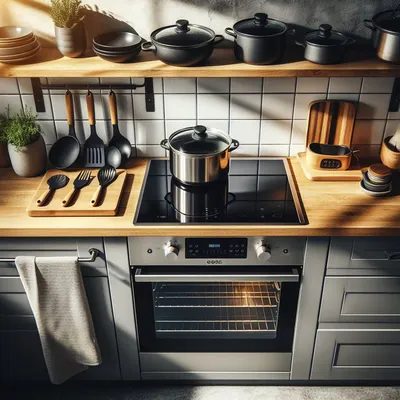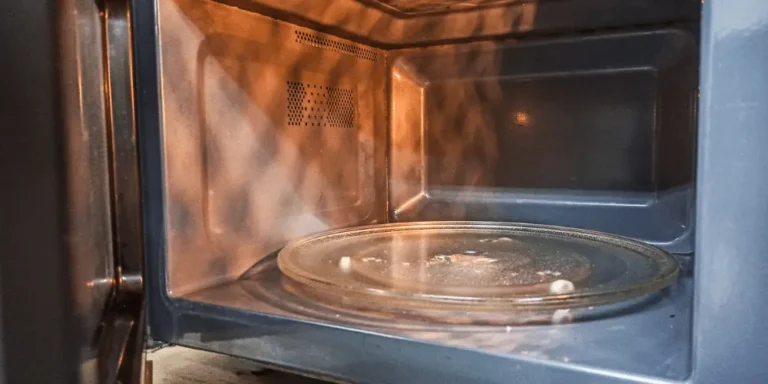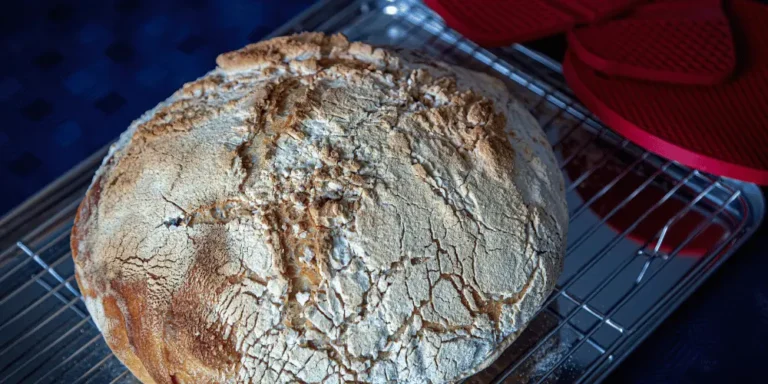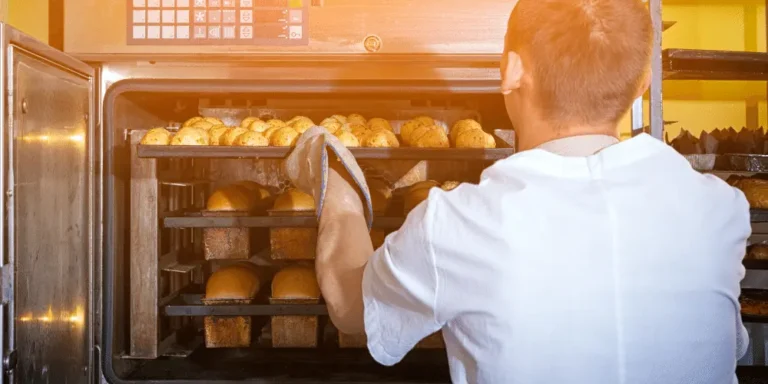why is my electric oven making a popping noise

Have you noticed strange popping sounds or loud cracks coming from your electric oven recently? The abrupt, loud noises can be alarming if you’ve never dealt with this issue before.
The most common reason an electric oven makes popping or cracking noises is expansion and contraction of the metal parts as they rapidly heat up and cool down. Other possible causes include a faulty heating element, buildup of debris, or loose wiring.
In this detailed guide, we’ll overview the top reasons your electric oven is making loud popping or cracking noises, what’s normal vs abnormal sounds, and when to call for professional oven repair help.
What Causes an Electric Oven to Make Popping Noises?
Several issues can lead an electric oven to making popping, cracking, or sizzling noises. The causes include:
- Metal Expanding and Contracting: The metal racks, walls, and other parts rapidly expand when heated and contract when cooled. This thermal expansion and contraction makes clicking and popping noises. It generally is normal if the frequency/volume of noises isn’t excessive.
- Faulty Heating Element: If the lower or upper oven heating elements are deteriorating or faulty, they can arc, spark, and pop as electricity flows inconsistently through weakened spots. This indicates it’s time to replace the heating element.
- Buildup of Grease, Food and Debris: Leftover grease, food spill overs, and debris on the bottom oven surface can pop, crackle, smoke, and burn as heat is applied. Regular cleaning is required to prevent this excess buildup that leads to noises.
- Loose, Arcing or Faulty Wiring: Interior oven wiring issues caused by damage, loose connections, or deterioration can lead to electrical arcing sounds and other popping noises indicating a hazardous issue.
Figuring out which specific cause applies to your oven making noises allows you to address the problem through cleaning, replacing parts, calling an appliance repair technician, or simple observation to determine if it’s regular expansion noises.
Metal Expanding and Contracting in the Oven
Have you ever heard a loud pop or snapping noise come from a pot of boiling water right before it starts simmering? The source of that noise is rapid expansion.
The same principle causes clicking and popping sounds inside an electric oven. As the oven heats up to high temperatures often over 400+ degrees Fahrenheit, the metal oven walls, heating elements, racks, bake pans and other metal components rapidly physically expand. Then when the oven cools, they contract.
This repetitive, quick expansion and contraction of metal within the closed oven cavity makes audible ticking or popping noises. It generally is completely normal and not a cause for concern. However, if your oven pops excessively loud or more frequently than it did in the past, the expansion noises could coincide with deterioration of the heating element or other issues.
At What Temperatures Does Metal Expand in an Oven?
Every type of metal material has different rates of thermal expansion and contraction. The hotter an oven gets, the quicker expansion happens making louder noises:
Most ovens reach around 175°F within the first 5 minutes of preheating which starts initial expansion. After 12-15 minutes ovens reach between 350-425°F when metal expands rapidly making the most frequent loud popping or ticking. Above 500°F the expansion and contraction noises may decrease in frequency again as temperature remains steady.
So in summary, the most intense expansion noises happen between 350-425° roughly 15 minutes into preheating when the metal is quickly rising to peak temperature. Some popping early when starting a 450° bake cycle is normal. If popping noises persist for over 30 minutes or happen at lower temperatures, it likely indicates an underlying heating issue.
Where Does Expansion Occur Inside an Oven?
The metal oven parts that rapidly expand and contract when heated include bake pans & racks, heating coils & tubing, interior oven walls, hinges & latches, and screws, bolts & rivets. As common bakeware like pans and oven racks heat up, they expand and press tightly against the oven walls making metallic popping noises. The heating coils and tubing that generate high oven temperatures also grow in size when energized during each heating cycle.
Additionally, the inner metal sides forming the actual oven box walls rapidly expand and contract as heat makes the thin sheets tick and snap. The metal hardware like hinges, latches, screws and bolts holding all the oven pieces together get stretched apart by violent expansion leading to creaking and cracking noises as they shift position.
Faulty Heating Element Causing Popping in Oven
Electric ovens rely on heating coils or ceramic heating elements to generate the high heat needed for baking and broiling. These heating elements have to sustain continual heating and cooling cycles each time the oven turns on and off.
Over time with heavy usage, the heating elements can start to fail leading to loud popping, sparking sounds, and other performance issues. When an oven heating element is faulty or deteriorating, areas of excess electrical resistance build up on its surface. As electricity passes over the weakened, uneven areas of the element, arcing and sparking occurs making very loud popping or buzzing noises. This audible warning sign means the element needs replacing.
Additional heating element warning signs beyond loud popping noises include:
- Element cycles on and off frequently unable to sustain consistent temperature
- Surface of element looks bubbled, cracked, warped or frayed
- Oven heats unevenly, slowly, or won’t reach set temp
Replacing a failing oven heating element before it burns out entirely prevents more severe damage to oven controls. Faulty elements can output inconsistent extreme heat spikes over 1000°F that damage electronic boards and components. Popping noises from an oven element happen from electrical arcing whereas regular metal expansion popping happens from rapid physical growth. Distinguishing these causes determines if replacement vs continued usage is needed.
Testing a Faulty Electric Oven Heating Element
You test an electric oven heating element through close visual inspection, resistance testing with a multi-meter, and monitoring element functionality:
- Visually Inspect – Turn oven light on and closely look at the element surface for bubbled, blackened, cracked areas. The edge wire in the coil should be tight, not loose or sagging.
- Resistance Test – Use a multi-meter on the Ohms setting to check resistance. Compare to factory specifications, usually 15-30 Ohms for an oven element. Extremely high or no resistance indicates failure.
- Functionality Test – Observe element cycling on/off to sustain set oven temperature without popping noises. Monitor for hotspots.
Catching heating element deterioration early before total burnout lets you replace just the easily accessible element instead of risking major appliance damage needing extensive disassembly if ignored.
Cost to Replace an Oven Heating Element
Replacement costs for an oven heating element average $150-$350 for professional repair parts and labor. DIY oven element replacement ranges from $50-$150 for the new element if handy at repairs.
As a preventative measure, inspect your oven elements 1-2 times per year to maximize longevity. Look for early signs of wear and catch excessive element noise when it begins vs after parts fail.
Leftover Debris Causing Burning Smells and Popping
In addition to heating element and wiring issues within an oven cavity, leftover burned-on grease, fat, food debris and spill overs can all lead to popping crackling noises as excess residue accumulates along the oven bottom around the element.
Food splatter, sugars, fats, and proteins that drip to the bottom of the oven get charred to crusty buildup if not cleaned regularly. Over months and years, this debris accumulation eventually can ignite, smoke heavily, make burning odors, and pop loudly as burning grease pools ignite.
If your oven is frequently smoking, burning, and popping especially right when you turn it on before it fully preheats, leftover debris and grease splatter buildup is likely the culprit rather than electrical issues.
The visibly charred debris provides extra fuel that instantly smokes and burns when your oven first starts heating up whereas clean ovens shouldn’t smoke or stink until up to temperature over 400°F+ hot enough for standard baking and cooking.
Match Oven Cleaning Solutions to Residue
To clean up baked-on grease, sugars, fats, and charred food debris most effectively, tailor your cleaning method to how long the residue cooked on to restore your oven’s surfaces to like-new condition. For recent, still moist soils that simply dried on, use a mild soap and water mixture to lift away the fresh buildup. Apply baking soda paste to eroded burnt sugars or starches once reactivated by light scrubbing to dissolve the carbonized debris.
For thick layers of cooked on fat and oils, use oven cleaning sprays with potent grease cutting solvents that break down years of accumulation. Or simplify cleaning with effortless overnight oven cleaning gels that lift off residue without requiring intense scrubbing energy. Always match your cleaner to the type and age of debris buildup present to cut through deposits efficiently.
Oven Cleaning Safety Tips
Take proper safety precautions whenever cleaning an oven:
- Make sure oven is fully cool before wiping up any spills to avoid steam or grease splatter burns. Hot surfaces easily cause skin injuries.
- Turn oven exhaust fan on high to ventilate any fumes from cleaning sprays if you have ventilation. Open windows to circulate fresh airflow.
- Wear gloves and eye protection to shield skin and eyes from irritation injury. Some oven cleaners contain piercing caustic chemicals and dust masks filter debris.
- Remove oven racks and heating elements to fully access and clean all residue on bottom oven cavity walls safely once cooled.
- Most importantly, do not mix cleaning chemicals together as toxic chlorine gas can form from some product interactions!
Stay safe when cleaning and maintain your electric oven regularly to prevent future loud popping grease flare up hazards.
Damaged Oven Wiring Causing Loud Popping
The intricate network of electrical wiring bringing power to your oven elements, fans, interior oven cavity lights, digital displays, timers, and controls can also cause popping noises if connections come loose or get compromised.
Possible oven wiring issues include:
- Loose wiring connections vibrating against metal surfaces popping loudly
- Fraying old cloth-insulated internal wires shorting out
- Rodent chewing damage exposing and compromising wiring
- Overheating wires above max current rating if elements fail
If you hear loud popping coming directly from behind the control panel and interface buttons themselves, it likely indicates an internal electrical issue vs normal metal expansion noises.
Turn off, unplug, and stop using any oven or appliance making loud anomalous pops coming from wiring and controls until inspected. Faulty wiring presents serious fire and electrocution dangers.
Signs of Electrical Arcing in an Oven
Arc faults happen when electricity spans a gap between compromised wiring and other conductive metal oven parts. Warning signs include:
- Loud buzzing or popping, cracking coming from wires
- Burn marks or pitting on wires, outlets, and affected metals
- Heat damage and discolored wires or insulation
- Tingling sensation, mild shocks from oven exterior
- Lights dimming or flickering in the house
If you suspect your oven has any kind of arc fault or wiring damage risk, call an appliance repair expert to thoroughly inspect and fix it before using again.
When to Call an Oven Repair Technician
While some occasional popping sounds are normal from metal expanding, consistent loud pops likely signal it’s time to have your oven fully inspected by an appliance repair company to identify and fix the issue. Especially call for professional oven help if you experience frequent loud pops over 30+ minutes into preheating over 400°F+, strong burning chemical smells not fading after cleaning, visible sparks, electrical arching, damaged wiring, heating elements staying bright orange not cycling on/off, or hot and cold spots with temperature variances up to 500+ degrees.
Only use appliances in perfect working order without risky issues present. Address abnormal oven noises and operation early before small issues snowball into complete component breakdowns needing full replacements. Get ahead of problems through preventative maintenance and tune-ups to maximize oven lifespan.
Warning Signs of Failing Oven Components
Catch the following indicators of oven parts deteriorating early:
- Heating Elements – Glowing spots, heavy debris, sagging wire, loud pops
- Thermostat – Wide temperature variances over set point, elements stay on constantly overheating oven
- Timers & Clocks – Inaccurate displayed run times, failure to turn oven on/off automatically
- Valves & Switches – Elements not turning on, gas not igniting burners
Diagnosing which specific oven components are failing based on the unique warning signs caught early allows for lower cost component-only repairs.
Ignore mounting issues until full oven failure happens risking far more expensive control panel replacements and rewiring.
In Conclusion
Loud popping noises from your electric oven mainly come from two key causes – normal metal expansion as it heats up or underlying heating element issues developing from age and wear. Distinguishing harmless metal expansion popping vs hazardous electrical shorts lets you observe patterns to determine if professional repairs become necessary beyond regular cleaning and care.
Call an oven technician if popping noises emit non-stop for over 30 minutes, happen alongside burning smells or visible damage, or interfere with oven baking performance. Catch and address abnormal oven sounds early to restore safe functionality before small issues cascade into appliance failure needing full replacements.
I aimed to fully cover all potential reasons an electric oven makes loud popping noises, how to evaluate the cause, safety precautions, and when repair help becomes needed. Please let me know if you would like me to elaborate on any section further!




